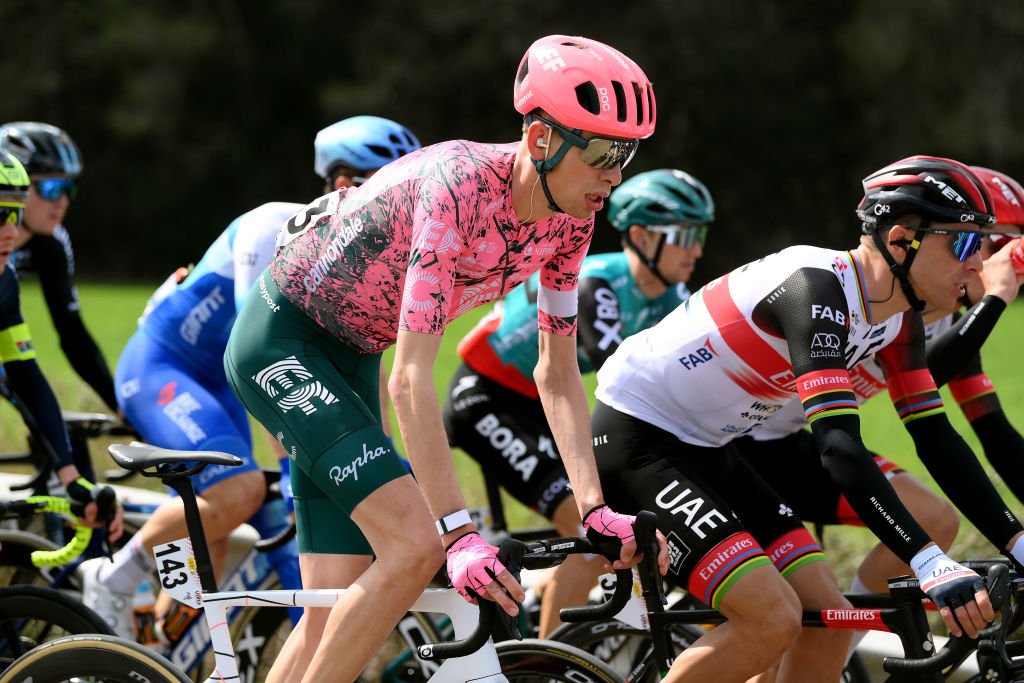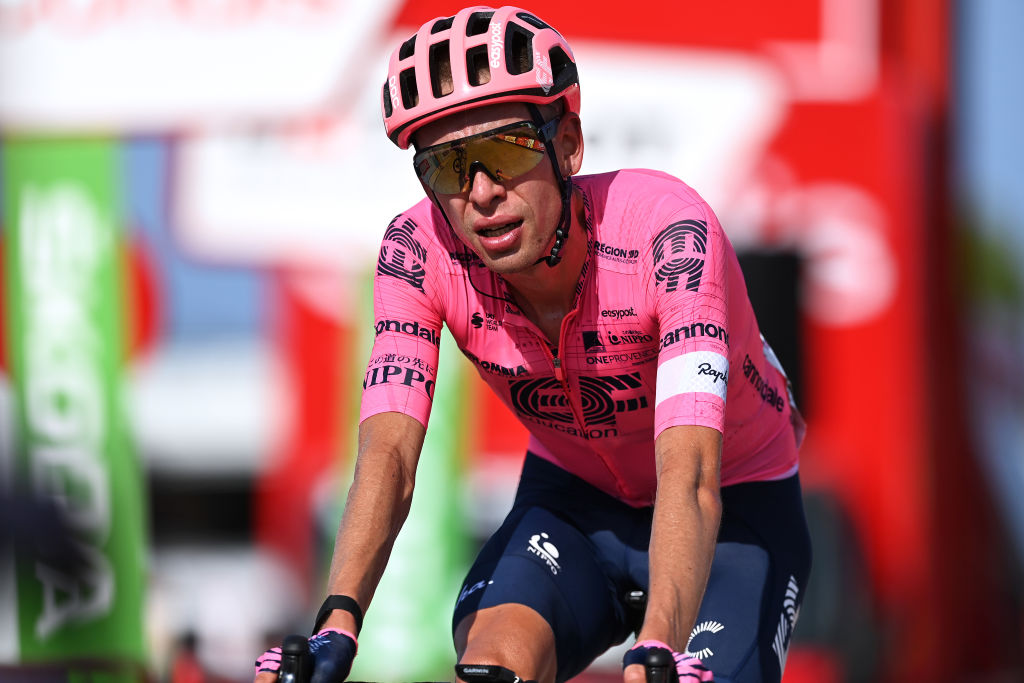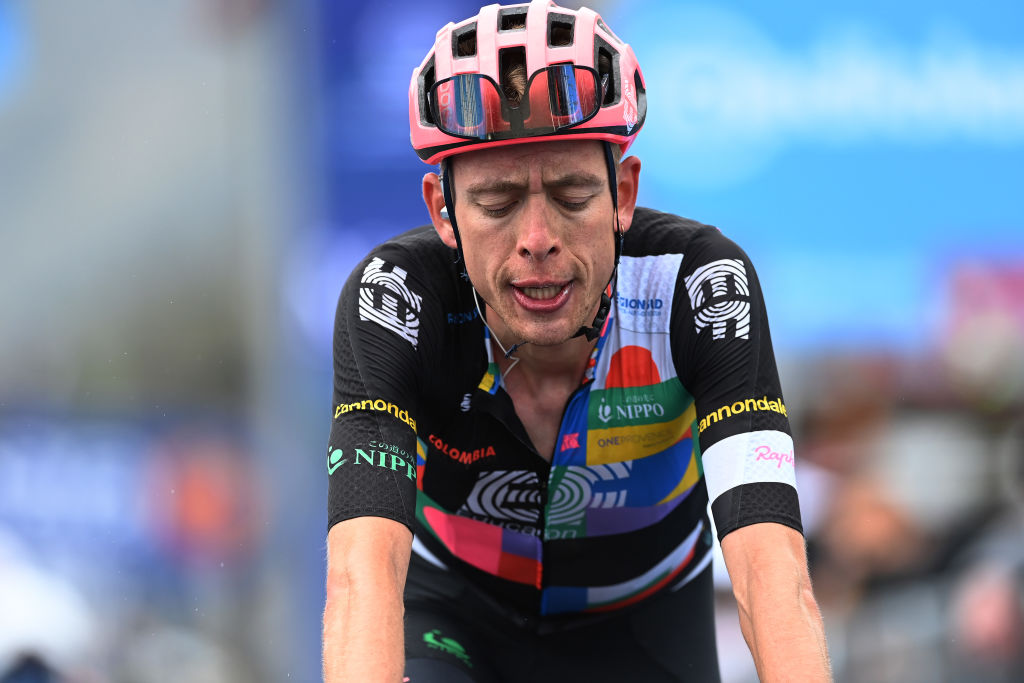Hugh Carthy: Riding GC is stressful, boring, but special
Briton looks ahead to his fifth Giro d'Italia with EF Education-EasyPost

Ask any Grand Tour contender about what the day-to-day of battling for a top position in Paris or Madrid or Milan feels like and they'll likely highlight the pressure and the tension, the teamwork and the training, the dreams of success and the frustrations of failure.
But pointing out that a lot of the racing for GC can be crushingly dull – that doesn't happen so often.
It was around about this time last year, Hugh Carthy (EF Education-EasyPost) tells Cyclingnews, that the tedious side of being a GC contender fully sank in, when he was riding the Giro d'Italia, traditionally feted for being the most exciting and unpredictable of all three Grand Tours.
"It was the first or second rest day, I was sat there in the team hotel with [EF Education-Easy Post sports director] Tom Southam, lying fourth or fifth and I'd lost a minute or something and we were going 'heck, it's boring riding GC. Stressful and boring. Because there's nothing to do most days except 'don't lose time'." Carthy recalls.
He then ticks off the daily mundane obligations of a GC racer. "Just sit near the front, don't lose time, don't crash and when you get to the finish, just be grateful you get there. Then you get halfway through it [the race] and you're like: 'what have I actually done?'"
But there's a logic behind it, Carthy explains, in that no news for a GC racer is mainly good news.
"You've achieved a lot by not having mishaps, when the bike's been good, when you've not had mechanical problems, when everybody's doing their job and when everybody's happy," he said.
Get The Leadout Newsletter
The latest race content, interviews, features, reviews and expert buying guides, direct to your inbox!
The price tag is that "You're sat there in the race thinking 'what's going on?'. But that's how it is and that's how it's got to be, it's a long game. And that's why it's so special when a big result comes along because you've had a month of full concentration and hard work to get there."
This kind of free-thinking approach, and refreshing honesty, about what it's really like being a Grand Tour racer neatly sums up a lot about Carthy's general attitude to racing and maybe helps explains why he's become one of the sport's top climbers, too.
Rather than any fake glamour or drama about GC racing, there's a kind of gritty, insightful, realism in his attitude to it all. Yet at the same time, you can also appreciate Carthy's conviction that with time and patience and hard work –along with handling the tedium, of course – his chance to shine should come.
When it comes to big results in the Giro, in each of his four previous participations, Carthy has come closer to nailing a major success as he's steadily made his way up the GC ladder: 92nd in 2017, 77th in 2018, 11th in his breakthrough year in 2019 when he memorably made a move over the Mortirolo in a rainstorm, and eighth in 2021, his first top-10 result.
Everybody can have their day

This year, Carthy's again the Giro d'Italia GC leader for EF, although he points out that as with most teams the squad will have at least two different potential contenders.
"Even a team like Ineos will go in with cards to play. And if they have just one guy for GC then they'll have a lot of other guys that on any given breakaway day can win a stage. So for riders like myself in that second wave [of GC challenger], it's quite normal for a team to run with a few options," he said
That's not to say Carthy won't have protected rider status. EF Education-EasyPost will try to combine that with other strategies, he said.
"In the first week, when there isn't so much available [for breakaways] because the GC is closer together, they'll focus on keeping me safe and out of harm's way. Then when the race opens up, the team can spread its wings and get out there, as we have done in most Grand Tours like the Vuelta over the years. Everybody can have their day."
EF's rider of choice for that role in the Giro d'Italia will be Magnus Cort, whose three very different stage victories in the Vuelta a España last year confirmed that the Dane is one of the most versatile racers out there.
"He can be helping one day and the next he can win a stage," Carthy said. "He's not a rider who needs a perfect three weeks to do that. If he's in form, he has no limits."
As for Carthy's condition, he recognises this year's build-up has not been as straightforward as in 2021 when he took his best Giro GC result to date. Still, his last performance in the Tour of the Alps has reassured him he's on the right path for Friday's start in Budapest.
"It's been different. Last year it all went pretty much as planned, every race I went to, I took a result home, my confidence grew and grew," Carthy said.
"This year, I wouldn't say it's been the opposite. But I've had to reassess and try and move forward in a different way so that's been a challenge."
"If my form had been back to square one in the Alps, then I'd have been nervous. But being there or thereabouts, knowing that I've got a lot in the tank is quite reassuring. I didn't feature, but I wasn't far off, shadowing and observing. By and large, I'm pretty sure I'm OK."
Riding well when the stakes are high
Carthy doesn't use his performances in 2019, arguably his stand-out Giro d'Italia to date, as a reference point for assessing his Grand Tour form, because circumstances were so different back then. He was an unknown quantity and a racer who was out of the top 10 GC battle that year when it came to climbs like the Mortirolo.
Carthy explains it with characteristic directness: "I was attacking and following riders I had no right to follow, getting involved in a race that wasn't really mine."
"I do remember the Mortirolo" – which will be revisited this year, although going up a different side of the climb – "because it was raining at the start and I just enjoyed it. We'd gone over another climb, Aprica I think, before, and it wasn't the hardest climb in the world, but you could see people going out the back," said Carthy, adding that he felt so good that it didn't feel like going up a climb.
"Then on the Mortirolo it went by really quick, and that's a sign that you know you're going well, too. That it's worth trying something. And I had nothing to lose so I could throw caution to the wind."
As for whether he will be looking at specific stages, this time around, Carthy said, it's more about playing to his strengths and knowing that he has a good track record on most of the tougher HC climbs out there. After all this is the rider that won on the Angliru, Spain's hardest single climb, in 2020.
"The Zoncolan, the Mortirolo - every day like that has the same value in a Grand Tour but on those days, I sometimes do find something, that extra bit," Carthy said. "Some riders are the opposite, they always seem to feel the pressure. but I always seem to ride well when stakes are higher."
"As I said, the first week, the priority is to get through it and see how I feel. If I feel good, then a bunch of other things can click."
"I'm looking forward to all of it, just getting on with it, getting out of Hungary and settling on to the Italian roads and the race itself."
The waiting game

Even if his one Grand Tour podium place to date was third in the 2020 Vuelta, it turns out that the Giro d'Italia is the race that he thinks "if everybody had the opportunity, they'd pick as their favourite."
Why? "It's got something for everyone, the way everything feels right when you're racing there and there's nothing too extreme."
"In the Tour, there's extreme stress and pressure, it's the biggest race for the squad. In the Vuelta there's a lot of heat, it's the last Grand Tour of the year so there's always a bit of a weird vibe to it….some people don't care if they're there or not, others are so desperate for results."
Warming to his point, Carthy also says he dislikes the way that the Vuelta and the Tour routes are so often revamped in an attempt to create a perennial sense of spectacle, whereas the Giro is more a race that sticks to what it knows. "It feels like it never changes," he said.
"If it's a sprint stage, it's a sprint stage, if it's a mountain stage, it's a mountain stage. Some stages of the Tour, you don't know if it's a sprint stage, a mountain stage or a breakaway. It'll start off as one thing and turns into another halfway through and it turns into five hours of mess."
"Then in the Vuelta, some of the stages can be just pigs, short stages up and down small roads, everyone at the end is thinking 'what are we doing here?'"
"In the Giro, a lot of the climbs get repeated, they don't go finding new climbs every five minutes or sticking gravel tracks in every year. Sprinters know they'll have five or ten chances, breakaway riders know there are eight or ten stages for them and it's nailed on."
"Then there's everything around it, the atmosphere, the way the fans get out for it. It feels like it's got a different atmosphere to the other Grand Tours."
While Carthy is now heading into double figures with Grand Tour starts, so any changes in his overall approach are fine-tuning, he said that as a GC rider he is experienced enough to know that the bigger picture is the only one that truly counts.
"Over the years, I think I've been learning that I mustn't get too excited over the first week and start attacking on the first uphill finish," he said. "A lot of riders get carried away and then pay the price later on."
"And you know that most days when nothing happens it's not that nothing happens. It's that you've done everything right and you've controlled everything you can control."
He sums up: "It's a long game and you have to be patient and wait for your moment. There's never the guarantee that you are going to make it. But you have to think long-term."
And if there are some days of tedium for Carthy to put up with in the meantime, so be it as for a GC racer, that particular game is always worth the candle.
Alasdair Fotheringham has been reporting on cycling since 1991. He has covered every Tour de France since 1992 bar one, as well as numerous other bike races of all shapes and sizes, ranging from the Olympic Games in 2008 to the now sadly defunct Subida a Urkiola hill climb in Spain. As well as working for Cyclingnews, he has also written for The Independent, The Guardian, ProCycling, The Express and Reuters.
